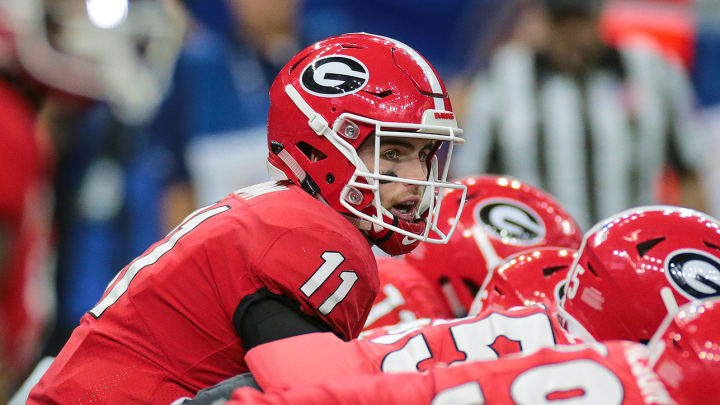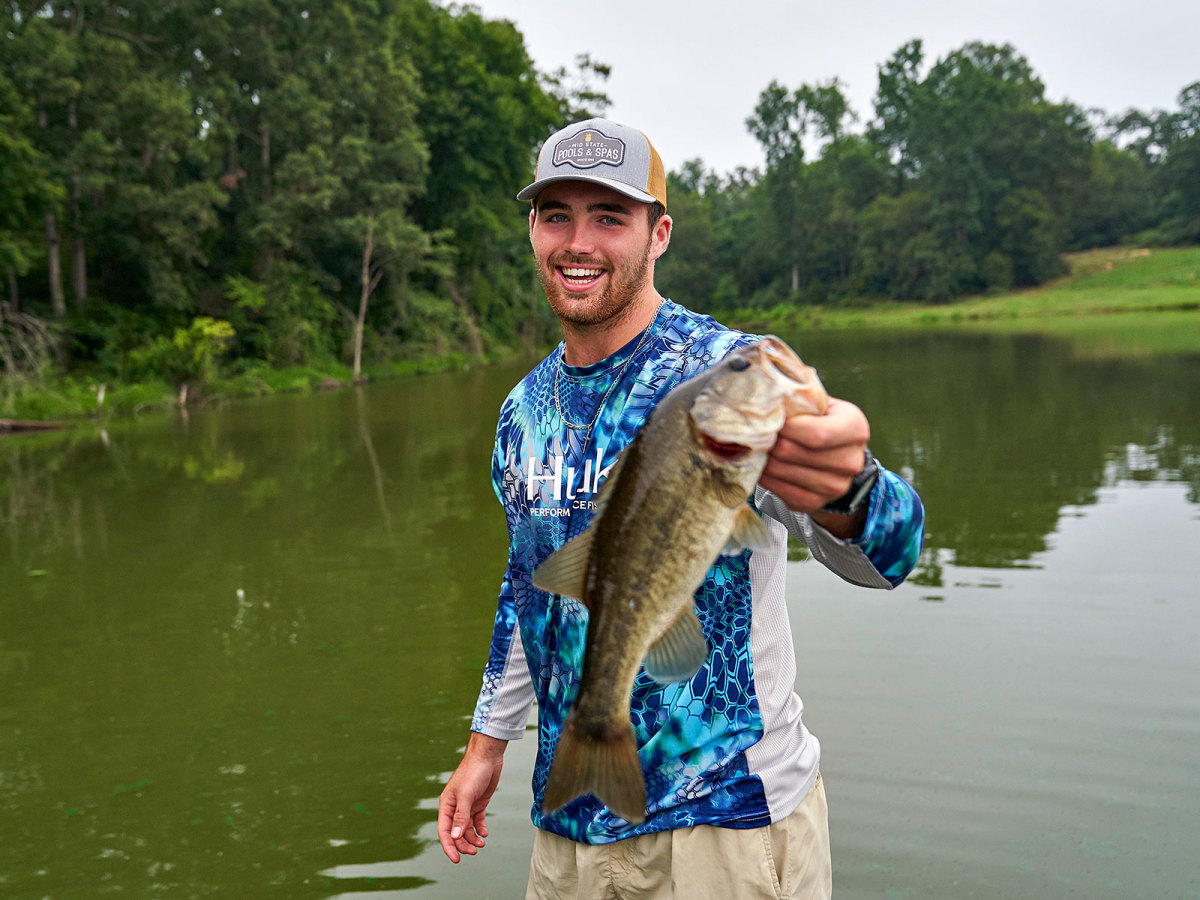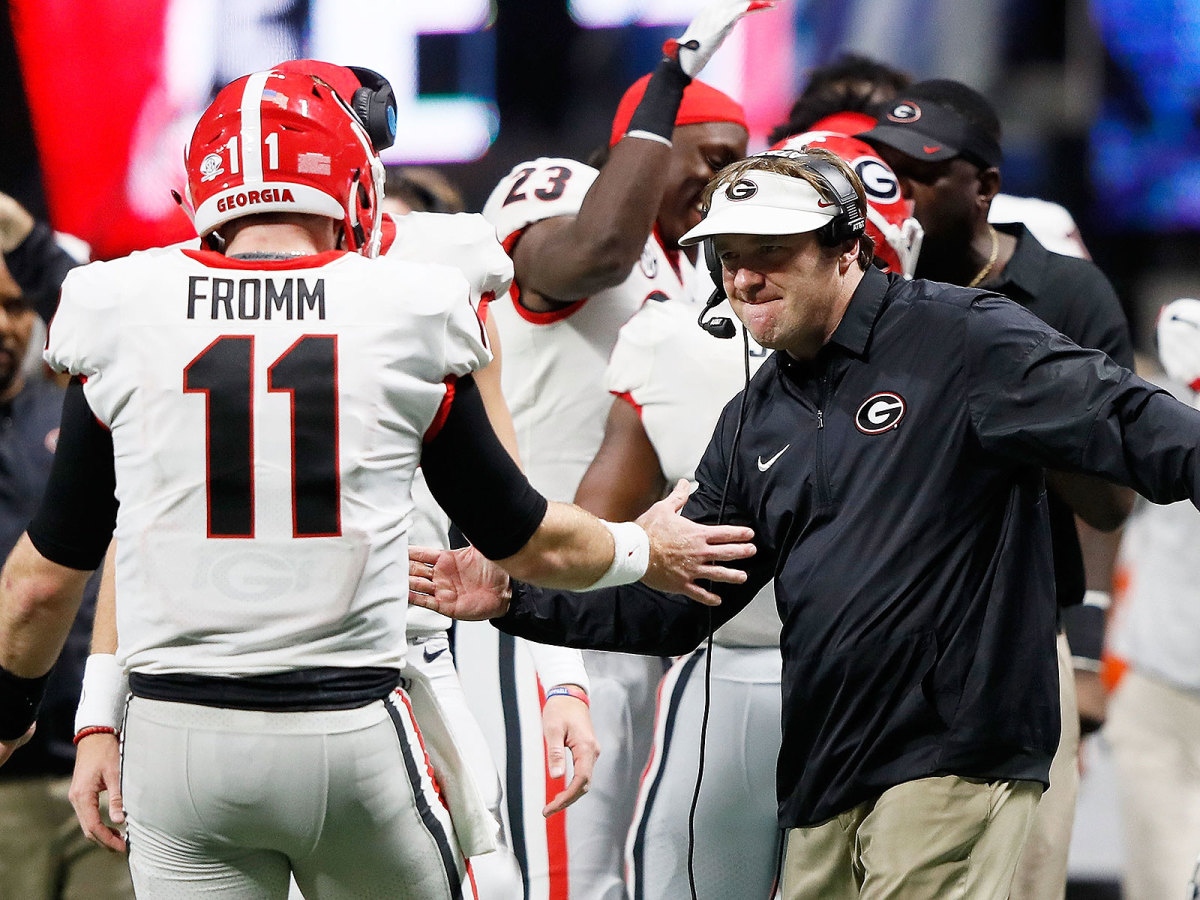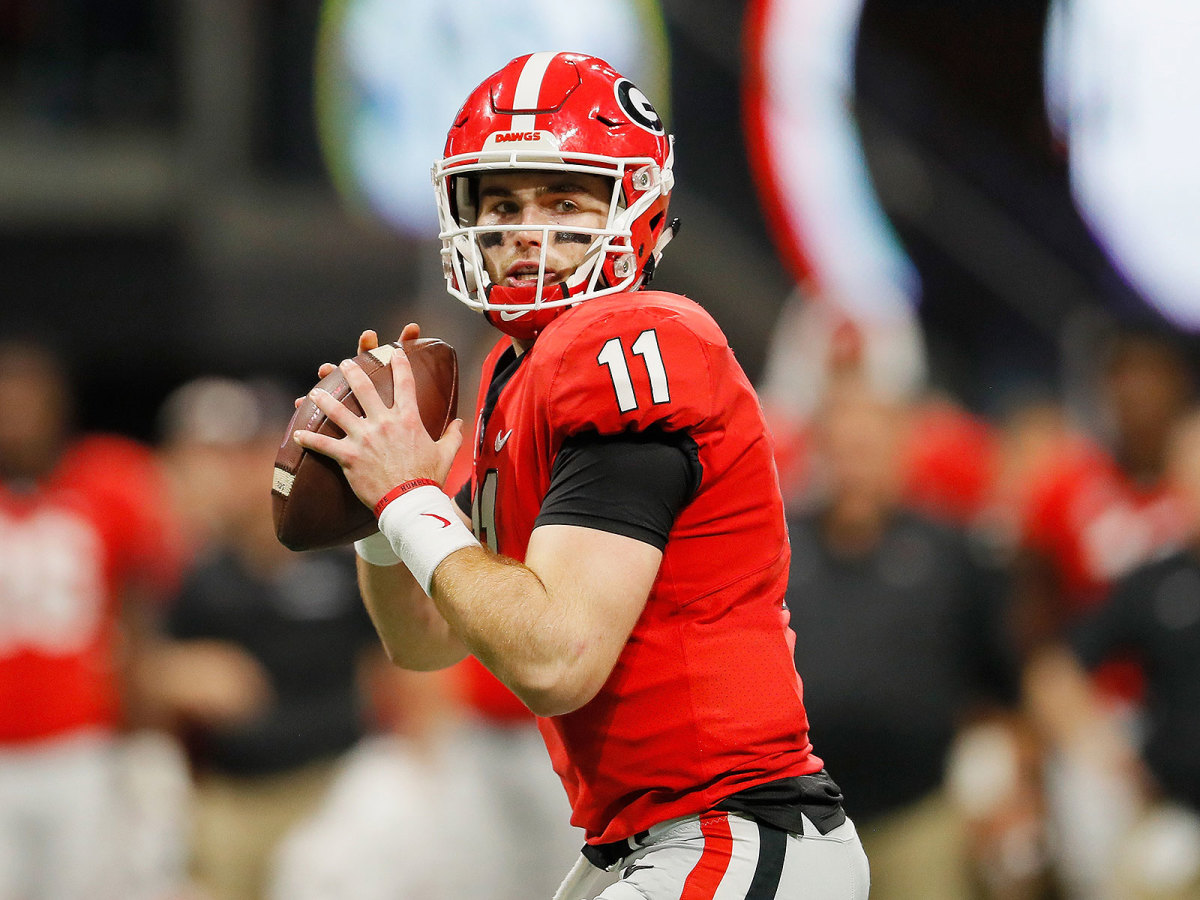Finally Entrenched as Georgia's QB, Jake Fromm Embraces a Different Kind of Pressure

This story appears in the Aug. 12, 2019, issue of Sports Illustrated. For more great storytelling and in-depth analysis, subscribe to the magazine—and get up to 94% off the cover price. Click here for more.
The last day of summer, the last day before football workouts start again, and Jake Fromm is cruising down a back road, one hand on the wheel, singing along with country music on the stereo, his roommate Charlie Woerner riding shotgun. They're heading for the Georgia countryside, east of Athens, to spend their final morning of freedom fishing on their buddy's farm.
They pass grazing cows and haystacks and miles of farmland, until they reach the property with the red dirt road and the two giant silos out front. They follow the narrow driveway up the hill, through acres and acres of sorghum, and there, beyond the main house, it comes into view: a modest pond, tucked back near the woods.
This is Fromm's happy place, this 182-acre family farm that sits about a 25-minute drive east of the University of Georgia. He started coming here his freshman year, around the time he became the Bulldogs' starting quarterback, when a friend invited him out hunting. Now, Fromm is close with the family and has an open invitation to come use their plot of land whenever he wants, whenever he needs to get away.
"It's definitely an escape for me," he says. "Football is just go, go, go. Then you go out hunting and sit in a stand for two, three, four hours. Just relax. I love it."
On this Wednesday in mid-July, Fromm and Woerner arrive at the pond around 7:30 a.m. The farm is silent, but for the birds chirping, bugs buzzing and Fromm singing to himself as they board their vessel, a run-down pontoon boat that uses a broken cinder block as an anchor. Woerner starts them on their usual lap around the pond, and Fromm starts top-water fishing, throwing his cast to the edge where water meets land, before reeling it back across the surface of the pond. The lure is supposed to mimic a living thing and draw the fish to the surface to attack. Every time you get one, it’s like . . . chwoo,” Fromm says. “It reminds me of Shark Week when you’re watching the guys drag the little fake seal behind the boat, and the great white’s coming to get it.”
After just a few minutes of this, Fromm catches a largemouth bass. He's had lots of practice, see, spent plenty of time on this pond, reflecting. In his first two years at Georgia, Fromm faced more pressure, more scrutiny than just about anyone in college football. He went through not one but two high-profile quarterback battles. He split practice reps, faced countless headlines about his play and had to continually fight for his starting job. Each time, Fromm survived and emerged a better quarterback. Now, the two who challenged him are gone, starting at other Top 25 schools. The three of them will likely shape the coming college football season.
For one more morning Fromm is trying not to think about all that. On the shore he spots the owner of the farm, who wants to say hello before heading to work. They banter like old friends, and then the man asks, "How long are y'all staying?"
"I don't know," Fromm says, grinning. "Whenever we get done catching them all."

Fromm grew up in Warner Robins, Ga., a small town just outside of Macon, and that's where he learned to fish and hunt and love football, specifically Bulldogs football. Jake's father, Emerson, had attended Georgia, and the family often built their weekends around watching games. When Jake was about 10, he begged his grandfather to buy him a Herschel Walker autographed helmet, and that became the centerpiece of the family's game room. Fromm dreamed of wearing a G helmet himself someday.
When he was a junior at Houston County High, he was a four-star recruit, but Mark Richt, then the Bulldogs' coach, didn't offer him a scholarship. Richt already had a signed letter of intent from five-star QB Jacob Eason from Lake Stevens, Wash., who was a year older than Fromm. Richt, it seemed, wanted to give Eason room to develop. “As a [teenager], you’re a little bit sour,” Fromm says.
Instead he verbally committed to Alabama. Through the recruiting process, the Fromms dealt a lot with Nick Saban, of course, but they became close with one assistant in particular, Kirby Smart, the defensive coordinator. Smart had grown up in Georgia, too. He'd played for the Bulldogs and was responsible for recruiting most of the state for Alabama. "It was just easier to relate to Kirby, because he understood who we were," Emerson Fromm says. "He grew up hunting quail, stuff like that."
Then, in November 2015, Georgia fired Richt and replaced him with Smart. As one of his first orders of business, Smart flew to Washington to make sure Eason was planning to honor his commitment. Not long after that, though, Smart offered Fromm a scholarship, too. He wasn't bothered by the idea of having two top-flight quarterbacks, only a year apart, even if inevitably it would leave one of them unhappy.
Having spent 11 years working under Saban, Smart subscribes to the notion that competition brings out the best in everyone. He told Fromm that he could compete with Eason for the job when he arrived, a year later.
Fromm started campaigning well before that. As a high schooler, he'd drive to Athens and sit in on quarterbacks meetings. Even then, "Jake understood what was going on," Smart says. "There were questions being posed to the quarterbacks in the room that he could answer. He understood. His [mind-set] was, I'm as smart as those guys, I'm going to outwork them, and I'll end up beating somebody out. He was very confident. I remember coming to meetings and him saying, I’m going to be fine here.”
Fromm enrolled early, in January 2017, and immediately immersed himself in the playbook. But no amount of studying could make up for a lack of experience, and Eason had that: He had started all but one game the year before, in an 8–5 season. That spring, Eason took most of the first-team practice reps, and Smart named him the starter in July, ending the competition before it ever picked up.
Not knowing how much he'd play that fall, Fromm began asking around for good hunting spots in the area. The team trainer's son, a walk-on long snapper, mentioned he had a friend with a farm just east of campus. They made plans to go dove hunting the Sunday after Georgia's season opener against Appalachian State. Then on the third drive of the game, Eason sprained a ligament in his left knee, and Fromm took over. He played well enough (143 yards, one touchdown) to lead Georgia to a 31–10 win. The next day, Fromm woke up early and visited his happy place for the first time.
Over the next few weeks, as Eason remained sidelined, Fromm eked out a 20–19 win over Notre Dame on the road and throttled 17th-ranked Mississippi State by 28 points at home. All the while, Smart kept an eye on his freshman quarterback. "It was a matter of, Hey, if Jake struggles or if Jake's not The Guy in a game, we've got to be ready to test the other guy," Smart says. "But that really never happened."
Working through a typically treacherous SEC schedule, Fromm showed poise beyond his years. He made good decisions, completed a high percentage of his passes and routinely checked into the right plays at the line. He seemed to have a calming effect on the whole team, especially in big games. He'd always be walking around, singing to himself. Country, gospel, rap—just whatever happened to be stuck in his head. It’s a habit, a sign he’s at ease. “That’s how you know Jake’s in the zone,” says Andrew Thomas, his left tackle.
Fromm has always been comfortable in the spotlight. When he was 12, he led Warner Robins to the 2011 Little League World Series. In four games in Williamsport, Pa., in front of an ESPN audience, Fromm hit three home runs, had eight RBIs and struck out 11 of the 19 batters he faced as a pitcher. "Jake handles pressure differently than anybody I've ever seen," says Phillip Johnson, Fromm's LLWS coach. "I don't know if it's chemicals in his brain, genes … The way he goes about his business is just different.”
More specifically, people often describe Fromm as having a quiet confidence about himself. As a high school senior, for instance, he agreed to participate in the Peter Berg Netflix show QB1, a 10-episode docuseries following highly touted high school quarterbacks. Most teenagers might have worried about how they’d come across. Not Fromm. He invited the camera crew everywhere, even joked with the producer about which scenes they’d use. He was so loose that some days, after filming ended, he’d drive away still wearing his mic.
A year later, Fromm was bullying his way through the SEC. He blew out Tennessee in Knoxville; Florida at a neutral site; and Auburn in the SEC title game. He didn’t put up flashy numbers (2,615 passing yards, 24 touchdowns, a 62.2% completion rate), but he kept winning, leading the Bulldogs to a 13–2 record. Eason, meanwhile, threw four passes in his only two mop-up appearances after the opener.
At first Fromm's sudden rise made things awkward in the Georgia QB room. He admits that his relationship with Eason "started a little slow." As Fromm explains, “He’d always been the big dog wherever he’d been, and I’d always been the big dog wherever I’d been.” But once it became clear that Fromm wouldn't be unseated, Eason warmed up and started giving Fromm advice as they prepped each week. "He helped kind of mentor me a little bit," Fromm says. "Helped show me the ropes."
His run culminated with a win over Baker Mayfield and Oklahoma in the Rose Bowl, and a trip to the national championship against Alabama. Fromm had a 10-point lead entering the fourth quarter, and was positioned to win Georgia's first championship since Herschel Walker won as a freshman in 1980. But Tua Tagovailoa, Alabama's own true freshman who committed two months after Fromm flipped to Georgia, brought the Tide back and stole the moment.
Afterward at the team hotel, Eason told Fromm he was transferring. It later came out he was heading to Washington. They hugged, and Fromm wished him well.

Smart had seen this all unfolding, Fromm pushing Eason out, and he made a contingency plan for Eason's potential departure. Midway through Fromm's breakout season, Smart secured a commitment from the top recruit in the country, a dual-threat quarterback from Kennesaw, Ga., named Justin Fields. Smart offered him the same opportunity he had presented Fromm—a chance to compete for the job. Like Fromm, Fields felt confident about his chances.
In many ways Smart handled this quarterback competition the same way he had a year earlier, giving Fromm, the incumbent, the majority of the first-team reps in practice, while rotating in Fields, the upstart freshman, every now and then. The big difference was how Smart portrayed the competition publicly. He didn't name Fromm the starter in July, as he had with Eason. He didn't even name a starter before the season opener. He let the public think Fromm and Fields were duking it out, and it became one of the most-talked-about position battles in the country.
Smart maintains now that everyone inside the program knew who the starter was, even if he never said it outright. "The media looooves to make a big deal about that," he says. "Our kids, they know. They're out there every day. There's no doubt in the offensive line's mind who the quarterback is, because he's in the huddle with them for 70, 80% of the reps.... Jake Fromm was never not going with the [first-teamers] when it mattered. The doubt may have been in his head. But in the coaches’ heads, he wasn’t beat out at any point in time.”
As the season began, though, Smart allowed doubt to linger. Fromm started every game and played the majority of the snaps, but Smart also rotated Fields in for a few plays nearly every week. The general assumption was that Fields would transfer if he didn't get at least some playing time.
When it came to the media, Smart did what he could to temper the attention surrounding his quarterbacks. Georgia did not make Fromm available for interviews for some time during preseason practice, and a team policy—one Smart brought from Alabama—forbade freshmen, including Fields, from doing interviews all season. Smart also told Fromm's family something to the effect of: I can’t stop you from talking to a reporter, but what are you getting out of it? When the Associated Press called Emerson Fromm, he said, "I'm not getting into it with Kirby. Kirby doesn't want me to do interviews." Before agreeing to be interviewed for this story, one year later, Emerson asked, "Kirby knows about this, right?"
When Jake has spoken about Fields publicly, he's said all the right things: "There was a lot of talk. I just decided I didn't want to listen to it. I knew when I came into the building who I was, what my teammates thought of me. I just came in and did my work."
The Fromms understood the tough position Smart was in. "Put yourself in Kirby's shoes," Emerson says. "Kirby had to do what Kirby had to do. He had two good quarterbacks."
In private, though, those closest to Jake could tell he wasn't entirely thrilled with the arrangement. He felt that leaving the game intermittently messed with his rhythm, and at a certain point, he thought he had played well enough to end the competition. "He was definitely frustrated at times," says Woerner, Fromm's fishing buddy, who's a tight end on the team. "He felt like he was doing all he could, and Justin would still get reps. [Jake] is a competitor. He wants to be The Guy."
Fromm has a hard time turning off that competitiveness. In each of his first two years at Georgia, he went duck hunting the week after the final regular-season game, ostensibly to relax, recalibrate. The first year he took Ben Cleveland, an offensive lineman. At one point that day, Cleveland remembers two birds flying at him before veering off toward Fromm. Cleveland tracked the birds, waited until they approached Fromm, and at the last moment, dropped them both. "Jake started yelling and hollering at me," Cleveland recalls. "He was so mad, because he swore he was about to shoot both them birds. That's just kind of how he is, you know? He wants it all."
With Fields pushing him, Fromm improved across the board as a sophomore, throwing for 2,761 yards, 30 touchdowns and a 67.3% completion rate. But Smart continued rotating in Fields all the way up to the SEC championship game, a rematch against Alabama. The stakes were high—win, and Georgia would make the College Football Playoff for a second consecutive season—and Fromm played a great game, throwing for 301 yards, three touchdowns and no interceptions. But on fourth-and-11 from midfield with 3:11 to go in a 28–28 game, Smart subbed in Fields, who had taken three snaps all day. Emerson Fromm compares it to benching a hot three-point shooter. "Would you pull Steph Curry out?" Emerson asks. "He's just hit four threes in a row, and you pull him out with three minutes left to go? I just think.... Hey, coaches get paid big bucks to figure that stuff out. It's just, I've never seen a two-quarterback system work."
Lined up in punt formation, Georgia snapped to Fields on what appeared to be a designed run, and Alabama swallowed it up immediately. On the next possession the Tide scored the winning touchdown.
In the aftermath, Fields and his father reportedly had multiple meetings with Smart. "Justin was definitely frustrated," the coach says. "He wanted to play. He was the eager freshman, which is probably the same way Jake would've been with [Eason], if he hadn't been playing."
About a month after the Bama loss, Fields announced he would transfer to Ohio State.

Back on the pond, Fromm is singing to himself again. He catches another bass, then another. Each time, he unhooks the fish and tosses it back into the water. He and Woerner made no plans to clean or cook any fish on this particular day, and Fromm's not counting his catches, either. He's at least trying to relax, take a break from all the competition.
This season will surely feel a little different for Fromm. Eason is gone, as is Fields. Fromm doesn't have to fight for his spot. He's ready to topple Alabama, win a national title and make a run at the Heisman Trophy. "I'm competing with myself now," he says.
Finally, Smart seems to be throwing his support behind Fromm, too. When Smart sits for an interview for this story, he tries pumping up his quarterback, and inevitably the conversation keeps winding back to Eason and Fields and to the two quarterback competitions that Smart orchestrated, which have defined Fromm's career thus far.
For a while, Smart gamely answers the questions. It's a testament to Fromm that he ran the other two out. Eason and Fields will now start for contenders elsewhere. If Fromm makes it back to the Playoff it's possible he could face a former teammate.
But when Smart is posed a hypothetical—What would have happened if Fields had stayed? How would he have handled Fromm versus Fields: Round 2?—the coach interjects: "Let me ask you something, is this interview about Jake? Or is this about Jacob and Justin? I really ... like, every time I talk to the media and they bring up Justin and Jacob, they want to write about that, and I really thought this interview was going to be about Jake. I want to give Jake the publicity that Jake deserves, because Jake's awesome, you know what I mean? And everything so far has been Jacob and Justin, Jacob and Justin. That doesn't make Jake who he is. Let's talk about who Jake is. Because Jake is a special person, a special talent. I mean, the kid is resilient in every way. He's been a winner his whole life."
Smart ticks off a few of Fromm's accomplishments. His voice is rising, his face getting red. He'd prefer not to draw too much attention to the competitions, to the fact that Georgia ever doubted Fromm. Smart would rather exclude all that. He sighs. “I don’t want this to come off like this is the Jacob and Justin and Jake [story],” Smart says. “It shouldn’t be about those kids. Those kids did everything right for Georgia while they were here. But they have nothing to do with Jake Fromm.”
For the first time in three years, that statement is true. There are no more battles, no more controversies to manage. Fromm enters this season with a new kind of pressure—the pressure to deliver as The Guy. The Only Guy.
